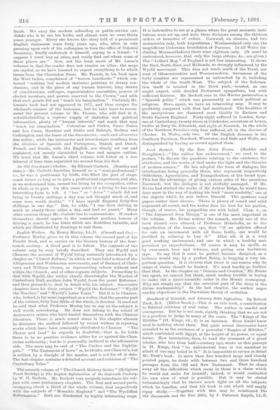Jacob Herbert. By the Rev. John Evans. (Hodder and Stoughton.)—"
The author has endeavoured," we read in the preface, " to discuss the questions relating to the existence, the attributes, and the works of God under the light and the theories of modern science." He has adopted the form of dialogue, the interlocutors being generally three, who represent respectively Orthodoxy, Agnosticism, and Evangelicalism of the broad type. This has the advantage of giving various sides of the questions discussed; but the dialogue is not skilfully managed. If Mr. Evans had studied the works of Sir Arthur Helps, he would have done more in the way of making his book "more readable," one of the objects which he sets before himself. The speakers read papers rather than discuss. There is plenty of sound and solid argument all round, and the writer does his best for his parties, though, of course, his sympathies are with belief. Chap. v., on " The Argument from besign," is one of the most important in the volume. Mr. Evans notices the remark, surely one of the most absurd over uttered, of Professor Helmholtz, as to the imperfection of the human oye, that "if an optician offered for sale an instrument with all these faults, one would be justified in refusing to buy it." After all, it is a very good working instrument, and one in which a healthy man perceives no imperfections. Of course it may be spoilt, as by over-much beer and tobacco, and poring over barbarous typo. To say that it must be perfect because designed, as a believer would say, by a perfect Being, is begging a very im- portant question. It is obvious that there is one reason why its range of vision should be limited. We need hardly go further than that. In the chapter on " Genesis and Creation," Mr. Evans has spent, we cannot but think, much useless trouble in trying to make out a quasi-scientific order in the Mosaic cosmogony. Why not simply say that the essential part of the story is the divine workmanship ? In the last chapter, the author urges sundry objections to the Darwinian theory of evolution.










































 Previous page
Previous page